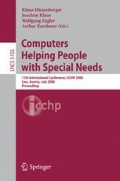Abstract
A computer-based test has been created as a training tool to raise awareness among university academic staff of some common experiences faced by people with visual, mobility, hearing and cognitive difficulties when using a computer. This test simulates experiences of disabled students who use computers and take computer-based tests, and provides advice and guidance to university teaching staff on how they may best cater for the needs of such students. The paper discusses the reasons for creating such a tool in such a format, its structure and content, and the outcome of its presentation to several groups of participants. Feedback from students with disabilities is to be used in the future development of the test.
Access this chapter
Tax calculation will be finalised at checkout
Purchases are for personal use only
Preview
Unable to display preview. Download preview PDF.
References
HESA: Higher Education Statistics Agency First year UK domiciled HE students by qualification aim, mode of study, gender and disability 2005/06 (2006), http://www.hesa.ac.uk/dox/dataTables/studentsAndQualifiers/download/disab0506.xls
U.S. Department of Education, National Center for Education Statistics Question:What proportion of students enrolled in postsecondary education have a disability? (2006), http://nces.ed.gov/fastfacts/display.asp?id=60
Francioni, J.M., Smith, A.C.: Computer Science Accessibility for Students with Visual Disabilities. In: Proceedings of the 36th SIGCSE technical symposium on Computer science education, St. Louis, Missouri USA, February 23-27, 2005, pp. 91–95. ACM Press, New York (2005)
UNESCO: The General Conference of the United Nations Educational Scientific and Cultural Organization Convention against Discrimination in Education (1960), http://www.unhchr.ch/html/menu3/b/d_c_educ.htm
EDF - European Disability Forum Promoting Equality and Combating Disability Discrimination: The Need for a Disability Specific Non-Discrimination Directive Going Beyond Employment (2007), http://cms.horus.be/files/99909/MediaArchive/Top5Campaigns/Microsoft%20Word%20-%20The%20need%20for%20a%20Disability%20Specific%20Directive_October%202007_FINAL.pdf
HMSO Disability Discrimination Act 1995 (c. 50) (1995), http://www.opsi.gov.uk/acts/acts1995/1995050.htm
HMSO Special Educational Needs and Disability Act 2001 (2001), http://www.opsi.gov.uk/acts/acts2001/20010010.htm
ADA: Americans With Disabilities Act (1990), http://www.usdoj.gov/crt/ada/adahom1.htm
Harrison, G., Gray, J.: A Computer-Assisted test for Accessible Computer-assisted Assessment. In: Proceedings of the 10th CAA International Computer Assisted Assessment Conference, July 4-5 2006, pp. 205–209. Professional Development Loughborough University, Loughborough (2006)
HEFCE: Higher Education Funding Council for England Centres for Excellence in Teaching and Learning (2005), http://www.hefce.ac.uk/learning/TInits/cetl/
Durham University Active Learning in Computing (2006), http://www.dur.ac.uk/alic/
Leeds Metropolitan University, Active Learning in Computing (2007), http://www.leedsmet.ac.uk/inn/alic
Powell, N., Moore, D., Gray, J., Finlay, J., Reaney, J.: Dyslexia and Learning Computer Programming. In: Proceedings of the 4th Annual Conference of the LTSN Centre for Information and Computer Sciences, Galway, Ireland, August 26-28, 2003, pp. 11–16. LTSN-ICS, Newtownabbey (2003)
Salzberg, C.: Preparing Higher Education Faculty for Students with Disabilities:It’s right; it’s smart; and it should be mandatory (2003), http://www.asdproject.org/resources/preparing_faculty.htm
Cohen, R.F., Fairley, A.V., Gerry, D., Lima, G.R.: Accessibility in Introductory Computer Science. In: Proceedings of the 36th SIGCSE technical symposium on Computer science education, St. Louis, Missouri USA, February 23-27, 2005, pp. 17–21. ACM Press, New York (2005)
Harrison, S.M.: Opening the Eyes of Those Who Can See to the World of Those Who Can’t: A Case Study. In: Proceedings of the 36th SIGCSE technical symposium on Computer science education, St. Louis, Missouri USA, February 23-27, 2005, pp. 22–26. ACM Press, New York (2005)
TechDis, TechDis Staff Packs (2006c), http://www.techdis.ac.uk/index.php?p=3_3
Pearson, E.J., Koppi, A.J.: Supporting staff in developing inclusive online learning. In: Adams, M., Brown, B. (eds.) Towards Inclusive Learning in Higher Education, London, New York, Routledge (2006)
UMUC: University of Maryland University College Accessibility in Distance Education A Resource for Faculty in Online Teaching (2005), http://www.umuc.edu/ade/
Salzberg, C., et al.: Opinions of disability service directors on faculty training: The need, content, issues, formats, media, and activities. Journal of Postsecondary Education and Disability 15(2), 101–114 (2002)
Getzel, E., Briel, L., McManus, S.: Strategies for Implementing Professional Development Activities on College Campuses: Findings from the OPE-Funded Project Sites (1999-2002). Journal of Postsecondary Education and Disability 17(1), 59–78 (2003)
TechDis Sim-dis: A view into the unknown (2006b), http://www.techdis.ac.uk/resources/sites/2/simdis/index.htm
TechDis TechDis (2006a), http://www.techdis.ac.uk/
Harrison, G., Gray, J.: An Improved Computer-Assisted test for Accessible Computer-assisted Assessment. In: Proceedings of the 11th CAA International Computer Assisted Assessment Conference, July 10-11, 2007, pp. 253–265. Professional Development Loughborough University, Loughborough (2007)
Northumbria University Human Resources, Evaluation of Staff Training and Development: Guidance Notes (2006), http://northumbria.ac.uk/sd/central/hr/std/td_eval/
Leeds Metropolitan University Assessment, Learning and Teaching at Leeds Metropolitan University: an Education Strategy (2005), http://www.leedsmet.ac.uk/about/keydocuments/Version32AssesmentTeachingLearningStrategy1.pdf
Author information
Authors and Affiliations
Editor information
Rights and permissions
Copyright information
© 2008 Springer-Verlag Berlin Heidelberg
About this paper
Cite this paper
Gray, J., Harrison, G., Sheridan-Ross, J., Gorra, A. (2008). Using a Computer Aided Test to Raise Awareness of Disability Issues amongst University Teaching Staff. In: Miesenberger, K., Klaus, J., Zagler, W., Karshmer, A. (eds) Computers Helping People with Special Needs. ICCHP 2008. Lecture Notes in Computer Science, vol 5105. Springer, Berlin, Heidelberg. https://doi.org/10.1007/978-3-540-70540-6_29
Download citation
DOI: https://doi.org/10.1007/978-3-540-70540-6_29
Publisher Name: Springer, Berlin, Heidelberg
Print ISBN: 978-3-540-70539-0
Online ISBN: 978-3-540-70540-6
eBook Packages: Computer ScienceComputer Science (R0)

